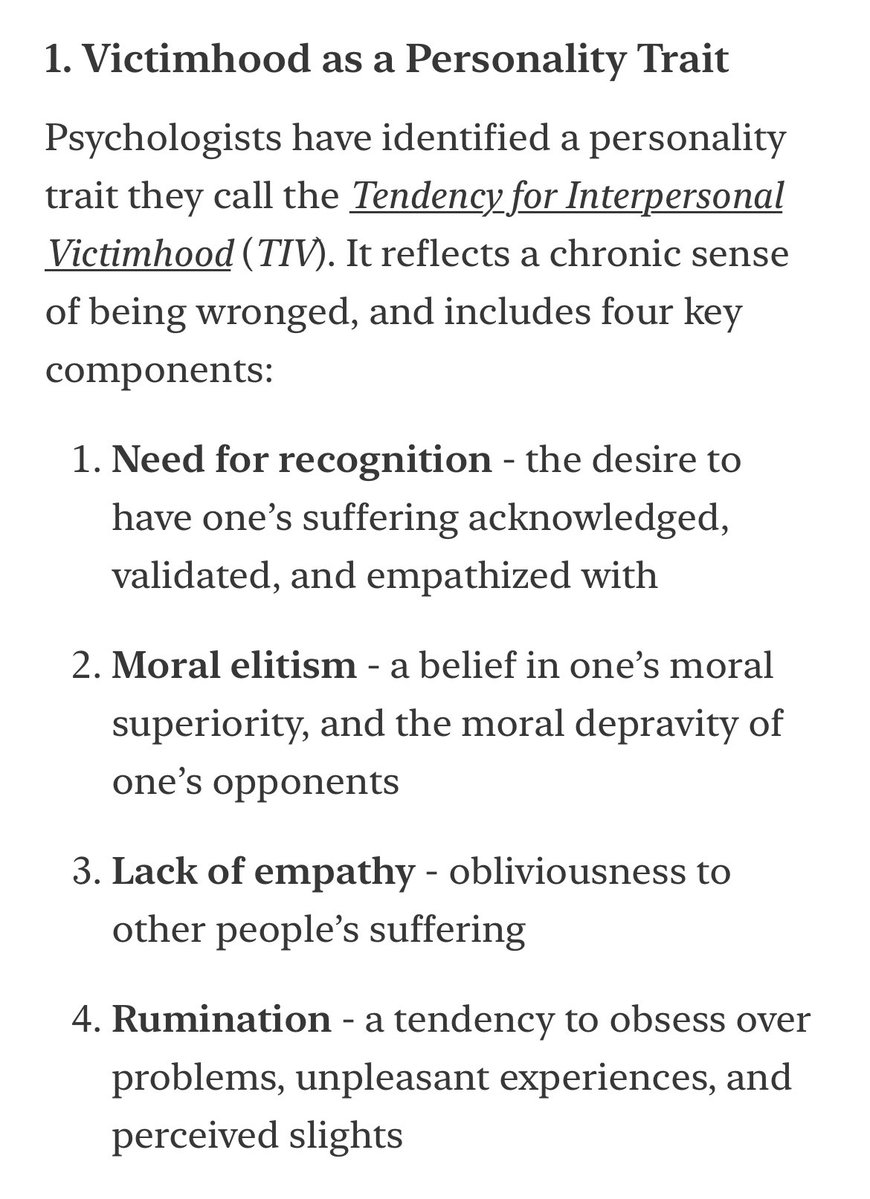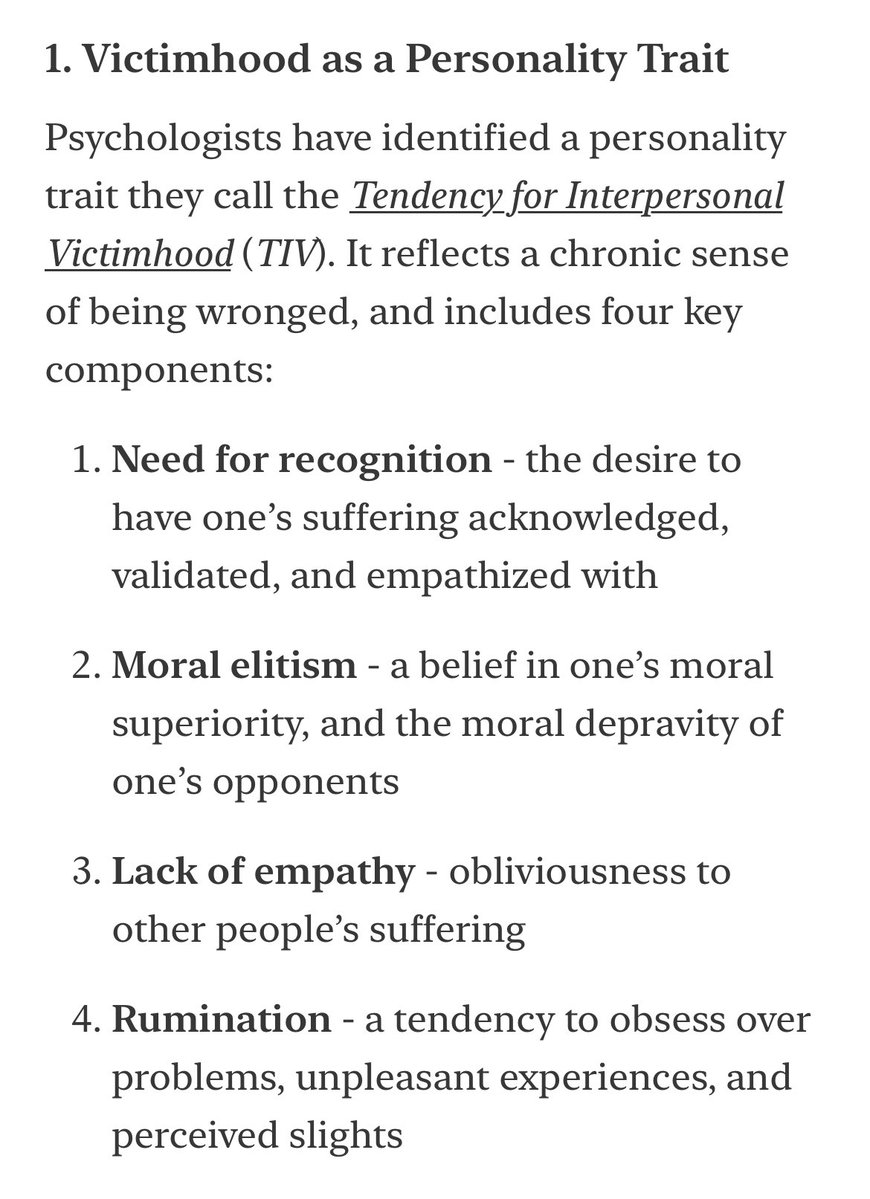New Study Reveals Shocking Personality Trait: Interpersonal Victimhood!
Understanding the Tendency for Interpersonal Victimhood: A Psychological Perspective
In recent discussions surrounding personality traits and their impact on interpersonal relationships, psychologists have introduced a concept known as the Tendency for Interpersonal Victimhood. This trait encapsulates a persistent feeling of being wronged or victimized in various social contexts. The implications of this trait are vast, influencing not only the individual who experiences it but also their interactions with others and the broader social environment.
Key Components of Interpersonal Victimhood
The Tendency for Interpersonal Victimhood comprises four fundamental components that define this personality trait:
Need for Recognition
One of the core elements of this trait is the Need for Recognition. Individuals with a high tendency for interpersonal victimhood often seek acknowledgment for their perceived grievances. This need can manifest in various ways, such as a desire for sympathy or validation from others. They may feel that their struggles and experiences are overlooked or minimized, leading to a heightened sense of injustice. This constant quest for recognition can strain relationships, as it may compel others to cater to these individuals’ emotional needs, often leading to resentment or frustration.
Moral Elitism
The second component is Moral Elitism, which refers to the belief that one possesses a superior moral standing compared to others. Individuals exhibiting this trait often perceive themselves as champions of justice or righteousness, viewing their experiences as more significant or valid than those of others. This mindset can lead to a dismissive attitude towards differing viewpoints or experiences, creating a divide between them and those around them. Moral elitism may also foster a culture of blame, where individuals feel entitled to cast judgment on others based on their perceived moral superiority.
- YOU MAY ALSO LIKE TO WATCH THIS TRENDING STORY ON YOUTUBE. Waverly Hills Hospital's Horror Story: The Most Haunted Room 502
Lack of Empathy
The third crucial aspect of the Tendency for Interpersonal Victimhood is a Lack of Empathy. Individuals with this trait may struggle to recognize or understand the feelings and experiences of others, particularly those who do not share their views or experiences. This lack of empathy can exacerbate feelings of isolation and victimization, as they may interpret differing perspectives as personal attacks. Consequently, this trait can hinder healthy communication and understanding in relationships, leading to conflicts and misunderstandings.
Rumination
Lastly, Rumination is a significant characteristic of this personality trait. Those who exhibit a tendency for interpersonal victimhood often dwell on past grievances and perceived injustices, replaying negative experiences in their minds. This rumination can create a cycle of negative thinking, reinforcing their victim identity and making it challenging to move forward. The repetitive focus on grievances can also impact mental health, contributing to feelings of anxiety and depression, further entrenching individuals in their victimhood narrative.
The Broader Implications of Interpersonal Victimhood
Understanding the Tendency for Interpersonal Victimhood is crucial not only for individuals who may identify with this trait but also for society as a whole. The prevalence of this personality trait can influence social dynamics, group interactions, and even broader cultural conversations.
When individuals with a strong tendency for interpersonal victimhood engage in discussions, they may inadvertently shift the focus away from collective issues to personal grievances. This shift can hinder productive dialogue and problem-solving, as it prioritizes individual experiences over collective understanding. Additionally, the lack of empathy and moral elitism associated with this trait can create divisions within communities, making it difficult to foster a sense of unity and shared purpose.
Addressing the Tendency for Interpersonal Victimhood
Addressing the Tendency for Interpersonal Victimhood involves a multifaceted approach. Individuals who recognize these traits within themselves may benefit from self-reflection and emotional regulation strategies. Developing empathy, actively listening to others, and practicing gratitude can help mitigate the feelings of victimhood and promote healthier interpersonal relationships.
Moreover, fostering open dialogues that encourage diverse perspectives is essential in addressing the broader societal implications of this personality trait. By creating environments where individuals feel heard and validated without resorting to victimhood narratives, communities can work towards greater understanding and collaboration.
Conclusion
The Tendency for Interpersonal Victimhood is a complex psychological trait that reflects a chronic sense of being wronged. With its key components of need for recognition, moral elitism, lack of empathy, and rumination, this personality trait can significantly impact interpersonal relationships and social dynamics. Recognizing and addressing these tendencies can pave the way for healthier interactions and a more empathetic society. Ultimately, fostering understanding and compassion is vital in overcoming the challenges posed by interpersonal victimhood, allowing individuals and communities to thrive.
By raising awareness of this personality trait and its implications, we can start to build a more inclusive and empathetic society that values diverse experiences while promoting understanding and collaboration among its members.

Psychologists have identified a personality trait they call the Tendency for Interpersonal Victimhood. It reflects a chronic sense of being wronged, and includes four key components: Need for recognition; moral elitism; lack of empathy; and rumination
[Link below.] pic.twitter.com/KxyrTwE02A
— Steve Stewart-Williams (@SteveStuWill) June 21, 2025
Understanding the Tendency for Interpersonal Victimhood
Have you ever met someone who seems to carry a perpetual chip on their shoulder? You know, that individual who always feels slighted or wronged, no matter the situation? This phenomenon is part of what psychologists refer to as the *Tendency for Interpersonal Victimhood*. It’s a distinctive personality trait that highlights a chronic sense of being wronged in various social contexts.
But what exactly does this mean? Let’s dive into this complex trait and unpack its four key components: the need for recognition, moral elitism, lack of empathy, and rumination.
The Need for Recognition
One of the most striking features of the Tendency for Interpersonal Victimhood is the *need for recognition*. Those who exhibit this trait often feel that their grievances, however small, deserve acknowledgment and validation from others. This craving for recognition can manifest itself in various ways, such as seeking out conversations that revolve around their struggles or feeling offended when their issues go unnoticed.
This need isn’t just about wanting a pat on the back; it’s deeply rooted in their perception of social interactions. When they don’t receive the recognition they crave, it can exacerbate their feelings of victimhood, leading to further conflict and resentment in their relationships. For instance, a person might feel slighted if their hard work is overlooked in a team setting, leading them to dwell on the perceived injustice rather than focusing on collaborative success.
Moral Elitism
Next up is *moral elitism*, another key component of the Tendency for Interpersonal Victimhood. Individuals with this trait often see themselves as morally superior to others. They might believe they possess a heightened sense of justice or ethics, which can lead them to view others’ actions through a highly critical lens. This perspective can create a divide, making it hard for them to engage in constructive dialogues or to see the gray areas in complex social situations.
Imagine a friend who constantly critiques the choices of those around them, all while feeling justified in their stance. This moral superiority not only isolates them but also feeds into their narrative of being wronged when others don’t share their views or validate their beliefs. This can create a toxic cycle where their perceived moral high ground justifies their victim mentality, making it difficult for them to foster healthy relationships.
Lack of Empathy
The third component of this personality trait is a *lack of empathy*. Individuals prone to interpersonal victimhood often struggle to recognize or understand the feelings of others. This can lead to a self-centered worldview where they prioritize their pain and grievances over those of people around them.
For example, someone might share a personal story about their struggles, but instead of being receptive to a friend’s similar experiences, they might dismiss them. This lack of empathy not only alienates others but can also prevent them from gaining perspective on their own situations. It’s a tricky situation because the inability to empathize can reinforce their feelings of being misunderstood or wronged, thereby perpetuating their victimhood narrative.
Rumination
Lastly, we have *rumination*, which refers to the persistent and repetitive focus on distressing thoughts or experiences. Those who exhibit the Tendency for Interpersonal Victimhood often find themselves trapped in a cycle of overthinking. Instead of moving on from perceived slights, they replay these moments in their minds, allowing feelings of anger and frustration to fester.
This rumination can lead to increased anxiety and depression, as individuals become consumed by their grievances. For instance, someone might dwell on a comment made in passing by a colleague, interpreting it as a personal attack rather than a harmless remark. This constant replay of the event can intensify their feelings of victimhood and exacerbate their existing emotional struggles.
The Impact of Interpersonal Victimhood on Relationships
So, how does the Tendency for Interpersonal Victimhood affect relationships? The truth is, it can be quite damaging. When someone is always focused on their grievances and feels wronged by others, it creates a barrier to genuine connection. Friends, family, and colleagues may find it challenging to engage with someone who is perpetually in a victim mindset.
Moreover, relationships thrive on empathy, understanding, and open communication—qualities that are often lacking in individuals with this tendency. As a result, interactions can become strained, leading to isolation for the person exhibiting these traits and frustration for those around them.
Overcoming the Tendency for Interpersonal Victimhood
If you or someone you know struggles with the Tendency for Interpersonal Victimhood, it’s essential to recognize these patterns and work towards healthier coping mechanisms. Here are a few strategies that may help:
1. **Practice Self-Awareness**: Start by acknowledging your feelings and thoughts. Are you consistently feeling wronged? Reflect on the situations that trigger these feelings and question whether they warrant the emotional investment.
2. **Cultivate Empathy**: Make a conscious effort to understand the perspectives of others. Engage in active listening and try to see situations from different viewpoints. This can help break the cycle of self-centered thinking.
3. **Limit Rumination**: Instead of dwelling on negative experiences, practice mindfulness techniques or journaling to process your emotions healthily. Redirect your focus to positive experiences and achievements.
4. **Seek Professional Help**: If these traits significantly impact your life, consider reaching out to a mental health professional. Therapy can provide valuable insights and coping strategies to manage feelings of victimhood.
Final Thoughts
Understanding the Tendency for Interpersonal Victimhood can be a crucial step for individuals looking to improve their relationships and overall mental well-being. By recognizing the components such as the need for recognition, moral elitism, lack of empathy, and rumination, we can begin to foster healthier interactions with ourselves and others.
Remember, it’s okay to feel wronged at times; what matters is how we process those feelings and move forward. Embracing a more balanced perspective can lead to more fulfilling relationships and a healthier mental state. Take it one step at a time, and you might just find that the world isn’t as full of injustices as it may seem.

